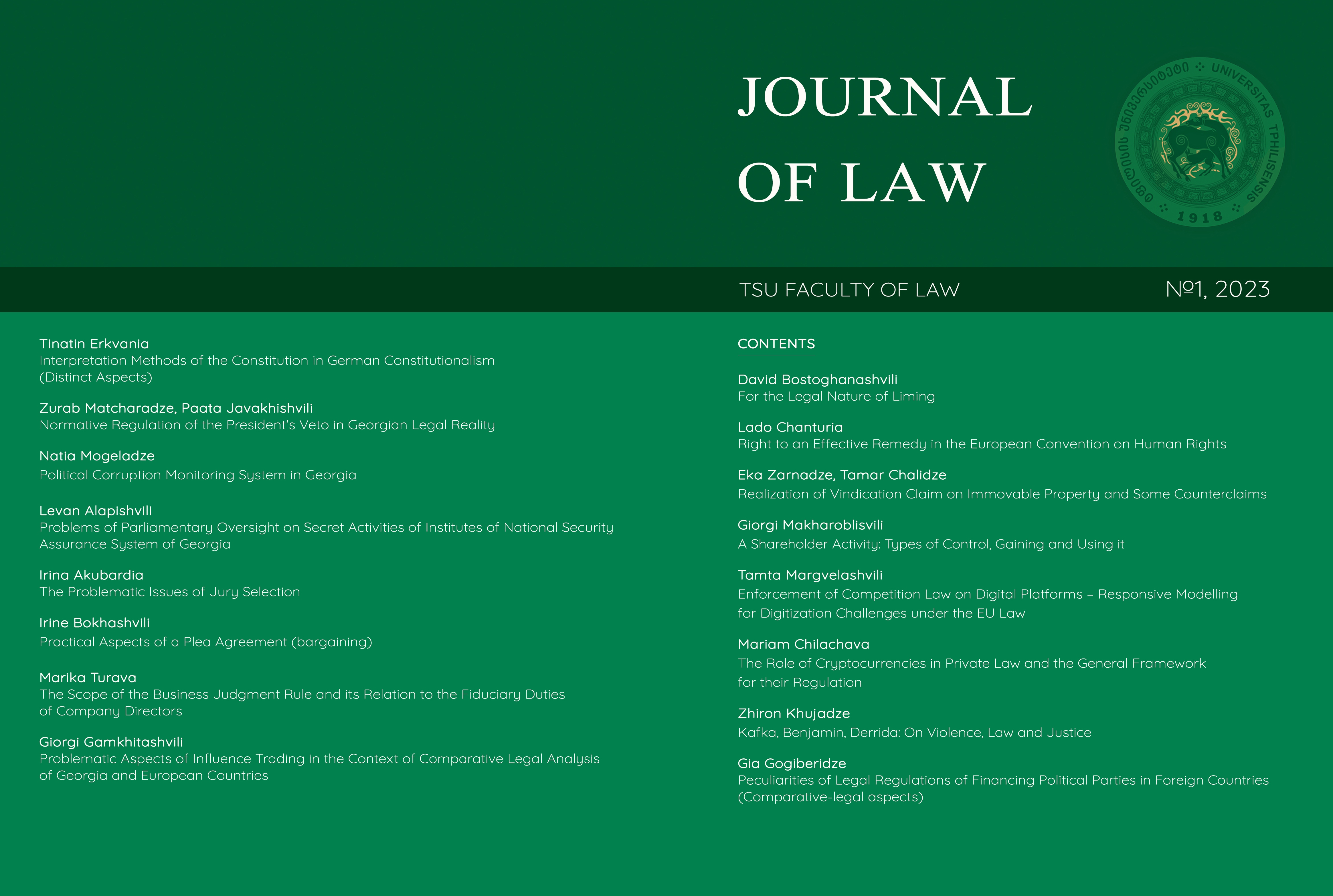The Role of Cryptocurrencies in Private Law and the General Framework for their Regulation
DOI:
https://doi.org/10.60131/jlaw.1.2023.7064Keywords:
Blockchain, Electronic Money, Virtual Currency, Fraud Schemes, Cryptography, Cryptocurrency, Crypto Provider, Money Laundering, Fiat Money, Wealth.Abstract
The 21st century is known for its strong technological advancements, where blockchain technology and a cutting-edge product built on it like cryptocurrencies are evolving daily. According to recent research, bitcoin is particularly appealing to both experienced and novice investors. Numerous individuals and legal entities around the world accept cryptocurrencies as payment. Cryptocurrency can be used to purchase both products and services. As a result, the need for legal regulation of cryptocurrency is high on the priority list.
The purpose of this article is to evaluate the legal status of cryptocurrencies, namely what its legal character is and whether it is conceivable to treat cryptographic currency as an object of private law, as property, as electronic money, or as virtual cash. Is it better than traditional currencies, and if so, what are they? All of the foregoing will be reviewed in light of the suggestions of the United States of America, Australia, Argentina, Brazil, Germany, Zealand, Japan, South Korea, China, Georgia, and the European Central Bank.
References
"On the National Bank of Georgia" regarding amendments to the Organic Law of Georgia https://matsne.gov.ge/ka/document/view/5562437?publication=0 [26.02.2023].
Law of Georgia "On Registration Fees" https://matsne.gov.ge/ka/document/view/5561976?publication=0 [26.02.2023].
Law of Georgia "On Promotion of Preventing Money Laundering and Financing of Terrorism" https://matsne.gov.ge/ka/document/view/5562294?publication=0 [27.02.2023].
Bayer D., Haber S., Stornetta S., How to time-stamp a digital document, Journal of Cryptology, NY, 1991, 99-111.
Bayer D., Haber S., Stornetta S., Improving the Efficiency and Reliability of Digital Time-Stamping, 1992, NY, 329-334.
Berberich M., Wohlfarth T., Virtual Currency Regulation Review, Great Britain, 2018, 118-131.
Chilachava M., Specific Private-Legal Aspects of the Blockchain System Functioning, TSU Journal of Law, No. 2 (english issue), Tbilisi, 2021, 163 (in Georgian).
Chkoidze N., Tomaradze G., Virtual/cryptographic currency and its peculiarities, regulation of virtual currency (on the example of BITCOIN), Tbilisi, 2014, 49 (in Georgian).
Crosby M., Pattanayak P., Verma S., Kalyanaraman V., Blockchain Technology: Beyond Bitcoin, NY, 2016, 71.
Cunliffe J., Is “Crypto” a Financial Stability Risk?, 2021, https://www.bankofengland.co.uk/speech/2021/october/jon-cunliffe-swifts-sibos-2021 [25.02.2023].
Cutts T., Bitcoin Ownership and its Impact on Fungibility, Coindesk, 2015, https://www.coindesk.com/bitcoin-ownership-impact-fungibility [25.02.2023]; also see Kelvin F., Low K., Teo E., Legal Risks of Owning Cryptocurrencies, NY, 2018, 47.
Diffie W., Hellman M., New Directions in Cryptography, IEEE Transactions on Information Theory, (1976), NY, 644-654, https://ieeexplore.ieee.org/iel5/18/22693/01055638.pdf [24.02.2023].
EBA, Eiopa E., EU Financial Regulators Warn Consumers on the Risks of Crypto-Assets, 2022, https://www.esma.europa.eu/sites/default/files/library/esa_2022_15_joint_esas_warning_on_crypto-assets.pdf [27.02.2023].
Eguino H., Schachtele S., A Playground for Tax Compliance? Testing Fiscal Exchange in an RCT in Argentina, 2020, 1-3, https://publications.iadb.org/publications/english/document/A-Playground-for-Tax-Compliance-Testing-Fiscal-Exchange-in-an-RCT-in-Argentina.pdf [26.02.2023].
European Central Bank Eurosystem, Virtual Currency Schemes, 2012, 9.
FinCEN, FinCen Cryptocurrency Regulation, 2013.
Frankenfield J., Cryptocurrency Explained With Pros and Cons for Investment, 2022, https://www.investopedia.com/terms/c/cryptocurrency.asp#citation-6 [25.02.2023].
Fu A., Virtual Currency Regulation Review, Great Britain, 2018, 96-108.
Gabisonia Z., The Essence and Problems of Legal Regulation of Blockchain Technologies, Journal of Comparative Law, Tbilisi, 3/2019, 6 (in Georgian).
Gomes F. M. D. N., Rocha T. M. V., Martins A. C. R., Virtual Currency Regulation Review, Great Britain, 2020, 60-72.
Gong L., Yu L., Blockchain & Cryptocurrency Regulation, China, 2019, 262-263.
Hamacher A., What Are Flash Loans? The DeFi Lending Phenomenon Explained, 2021, https://decrypt.co/resources/what-are-flash-loans-the-defi-lending-phenomenon-explained [25.02.2023].
Hu Q., Abdulhakeem S.A., Powered by Blockchain Technology, DeFi (Decentralized Finance) Strives to Increase Financial Inclusion of the Unbanked by Reshaping the World Financial System, Modern Economy, Vol.12 No.1, China, 2021, 5.
Kelvin F., Low K., Teo E., Legal Risks of Owning Cryptocurrencies, NY, 2018, 47.
Lansiti M., Lakhani K. R., The Truth About Blockchain, Harvard Business Review, 2017, https://hbr.org/2017/01/the-truth-about-blockchain [24.02.2023].
Lee J., Kim J., Yim S., Virtual Currency Regulation Review, Great Britain, 2018, 184-187, 251.
Lynch S., U.S. judge says SEC can pursue Bitcoin-related lawsuit, Washington, 2010, https://www.reuters.com/article/us-court-sec-bitcoin-idUSBRE97517G20130806 [26.02.2023].
Margossian A., Bagnall M., Mitra R., Halforty I., Virtual Currency Regulation Review, Great Britain, 2018, 6-17.
Moreno J., Virtual Currency Regulation Review, Great Britain, 2018, 1-6.
Nakamoto S., Bitcoin: A Peer-to-Peer Electronic Cash System, 2008, 1-8,https://bitcoin.org/bitcoin.pdf> [23.02.2023].
Norrridge R., Moir A., Morgan C., Growing Body of Common Law Decision That Criptocurrencies Can Amount to Property: Ruscoe v. Cryptopia Limited (in Liquidation) CIV-2019-409-000544, 2020, 728, https://hsfnotes.com/pwtd/2020/05/18/growing-body-of-common-law-decisions-that-cryptocurrencies-can-amount-to-property-ruscoe-v-cryptopia-limited-in-liquidation-civ [26.02.2023].
Olivera D., Russo C., Argentina’s Biggest Futures Market plans to join Bitcoin Party, Bloomberg, 2018, https://www.bloomberg.com/news/articles/2017-11-02/argentina-s-biggest-futures-market-plans-to-join-bitcoin-party?leadSource=uverify%20wall [26.02.2023].
Rodriguez-Ferrand G., Regulation of Cryptocurrency in Selected Jurisdictions, 2018, 2-5.
Sichinava D., Maghradze M., Principles and problems of transition to electronic money, in the collection: Globalization and Business, Tbilisi, 2018, 177 (in Georgian).
Soares E., Regulation of Cryptocurrency in Selected Jurisdictions, 2018, 21-25.
Sidley Austin LLP, Virtual Currency Regulation Review, Great Britain, 2018, 333-335, 345-350.
Umeda S., Regulation of Cryptocurrency in Selected Jurisdictions, The Law Library of Congress, 2018, 53-62.
Zarandia T., Property Law, Second Completed Edition, "Meridian" Publishing House, Tbilisi, 2019, 224-225 (in Georgian).
Zhang L., Regulation of Cryptocurrency in Selected Jurisdictions, 2018, 30-34.
Downloads
Published
How to Cite
Issue
Section
License

This work is licensed under a Creative Commons Attribution-ShareAlike 4.0 International License.









